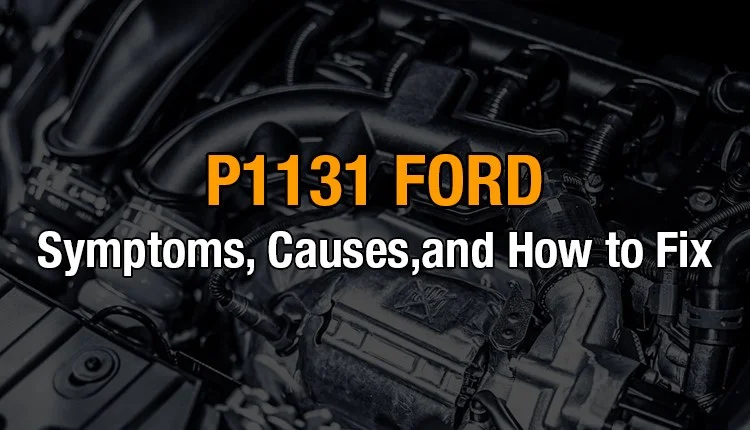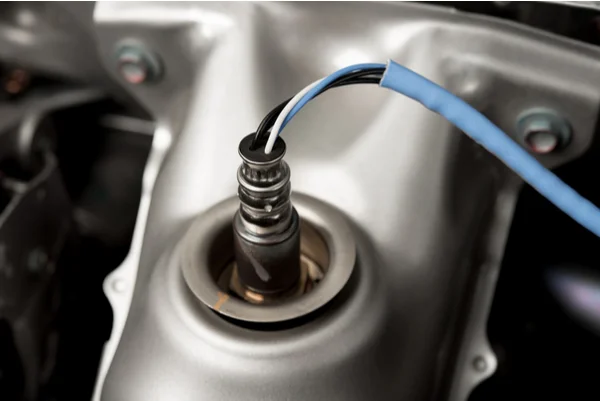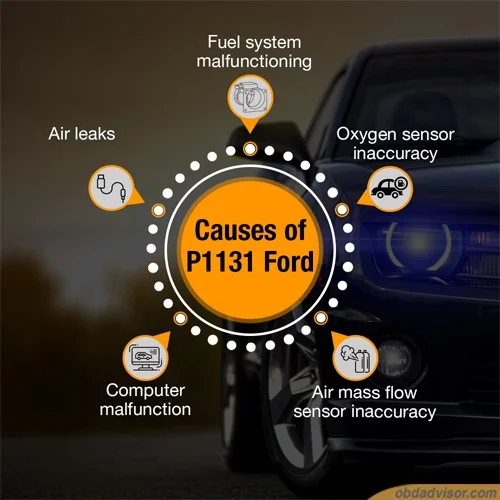P1131 Ford: Symptoms, Causes, and How to Fix
The OBD II code P1131 is quite common on most Ford Vehicles, including on Ford F150, Ford Ranger, Ford Taurus, Ford Explorer, Ford Expedition, Ford Mustang, and Ford Escort.

Introduction to P1131 on Ford Vehicles
The error code P1131 is displayed by getting feedback from the Lambda (or the oxygen) sensor. The Lambda sensor is responsible for detecting the amount of oxygen in the exhaust gases. Based on that, the PCM (Powertrain Control Module) manipulates whether the engine is running on a lean or rich fuel mixture.
A lean running condition of the engine happens when the engine runs on less fuel or too much air, ultimately resulting in the error code P1131 on Ford vehicles.
An engine running on a lean mixture, may lead to sluggish acceleration and reduced fuel economy. Thus it becomes crucial to understand the P1131 on Ford Vehicles and ways to resolve this error code.
Read more: Ford 302 vs. 351W: Which engine should I choose?
Code P1131 Ford Definition and Meaning

In simple terms, the OBD II code P1131, when displayed on your Ford Vehicle, indicates the PCM detected a malfunction. By estimating the O2 amount, the PCM assesses whether the engine is running on a rich or lean fuel mixture. A lean mixture can give rise to various problems and thus displays the code P1131.
Whereas, an optimized fuel mixture is preferred because of the following-
- Better Fuel Economy
- Better Acceleration
- Reduced tailpipe emissions
- Prolonged engine life
In contrast, an engine running on a lean mixture can give rise to many issues that can appear combinedly or separately. That is discussed in the coming sections.
Some of The Other OBD II Codes That Are Related to P1131 on Ford Vehicles are-
- P1137
- P1151
- P1157
- P0171
- P0174
Symptoms of P1131 on Ford
The most visible symptoms of the P1131 code is-
- Check Engine light ‘ON.’
- Slow Acceleration
- Poor fuel economy
- Car Unable to Start
Moreover, there are some other symptoms for the P1131 code on Ford. But, the chances of encountering them are minimal-
- Engine Stalling
- Engine Knocking
- A rise in Exhaust gas Emissions
- Engine frequently misfires
Causes of P1131 on Ford

There can be various causes for the error code P1131-
1. Fuel System Malfunctioning
Issues in the Injectors, fuel filter, pump, etc., can result in a low quantity of fuel reaching the combustion chamber. The components listed below collectively or individually can cause Fuel System Malfunctioning-
- Clogged Fuel filter: This may create a barrier to fuel passing the filter during the filtering process, thus creating a lean mixture.
- Defective Fuel Pump: A lean mixture can be formed due to the fuel pump’s inability to supply the fuel with the required optimal pressure.
- Faulty Fuel Injectors: The injectors are responsible for spraying the fuel into the combustion chamber. If they start to leak or become dirty, it may result in an interrupted fuel injection into the cylinder. The injectors with low pressure can result in the formation of a lean mixture.
2. Oxygen Sensor Inaccuracy
At times, it is possible that the sensor responsible for measuring the O2 in the cylinder malfunctions. Thus, reporting more oxygen in the mixture than the actual quantity. The amount of oxygen is proportional to the air quantity supplied. As a result, the PCM may display a lean mixture. Thus displaying the P1131 code.
3. Air Mass Flow Sensor Inaccuracy
The Air Mass Flow sensor estimates the amount of air that’s entering the cylinder. A faulty Air mass flow sensor may inaccurately assess the quantity of incoming air. Thus, as a result, the P1131 code may be displayed on the Ford vehicle.
4. Computer Malfunction
Though the chances of malfunctioning of an on-board computer are very low, however, a faulty on-board diagnostics system can inaccurately display the P1131 code.
5. Air Leaks
Innumerable hoses and gaskets are employed in an engine. These components are not built to last forever. Hence, it is possible due to incessant exposure to heat and pressure; any of these components gives rise to air leaks. Thus, air leaks can find its way into the engine, assisting in the formation of a lean mixture.
How Serious is P1131OBD II Code on Ford
Though the issues causing the P1131 code may not impact your vehicle’s functioning. However, if ignored, these can cause severe damage to other vital components in the long term.
A regular check-up or servicing might help to resolve the problems responsible for OBD II code P1131. Additionally, looking for the causes mentioned above can help fathom the issue much faster and easier.
Can You Drive with p1131?
It is not recommended to drive your Ford while the P1131 code is being displayed.
A petrol engine running on a lean mixture can cause problems like-
- Reduced Performance
- Engine Knocking (Inconsistent fuel combustion)
- Damage to Piston
A Diesel engine running on a lean mixture may not result in the same problems but still can cause-
- Low Output from engine
- Engine Stalling
However, the vehicle with the P1131 code can cause sudden jerks with lagging acceleration. Moreover, it may reduce the efficiency of the vehicle while increasing emissions.
Tools Needed to Fix any of these Issues-
How to Fix the Code P1131 on Ford?
The first and foremost thing to be done when checking for the causes of the P1131 code is to connect a car diagnostic scanner to the car’s OBD. Running a diagnostic scan can give comprehensive information on the malfunctioned system to help resolve the issue promptly.
Moreover, if running an OBD diagnostics does not helps then, follow these steps to fix the code P1131-
Step 1– Check and Replace any damaged engine air-intake hoses
Step 2– Tighten the Spark Plugs Connecting Wires
Step 3– Check and Resolve any issue with Distributor assembly, like rotor or cap
Step 4– Check any fault in the fuel supply
Step 5– Lastly, but importantly check the wiring and connection of the Oxygen Sensor.
If the issue still goes undetected, then visiting a service center might help.
Tips to Avoid p1131 in the Future
Here are a few Tips to Avoid OBD II Code P1131-
- Servicing your Ford F150/ Ford Ranger/ Ford Taurus/ Ford Explorer/ Ford Expedition/ Ford Mustang/ Ford Escort regularly
- Replacing worn off engine gaskets and hoses
- Monitoring the fuel injection pressure from the injectors
- Checking for any Engine air leaks
Frequently Asked Questions
Q) Why do lambda (oxygen) sensors fail?
- Lambda sensor is continuously exposed to the high temperature of exhaust gases. Thus heat and vibration can cause damage to the wirings and connections. Moreover, the lambda sensor can be faulty due to corrosion as well.
Q) What happens if my O2 sensor is damaged?
- A damaged O2 sensor doesn’t cause any serious problems. You can even drive with a bad O2 sensor. However, it may hamper other engine components in the long term and can even affect the overall vehicle’s performance.
Q) My Ford is driving fine, but it shows code P1131?
- This could be because of the malfunction of any of the components responsible for diagnostics, or your Ford is driving fine because the issue is still in its initial phase and can increase over time.
Read more : 9 Best Ford/Mazda OBD2/OBD1 Scan Tools for 2024
